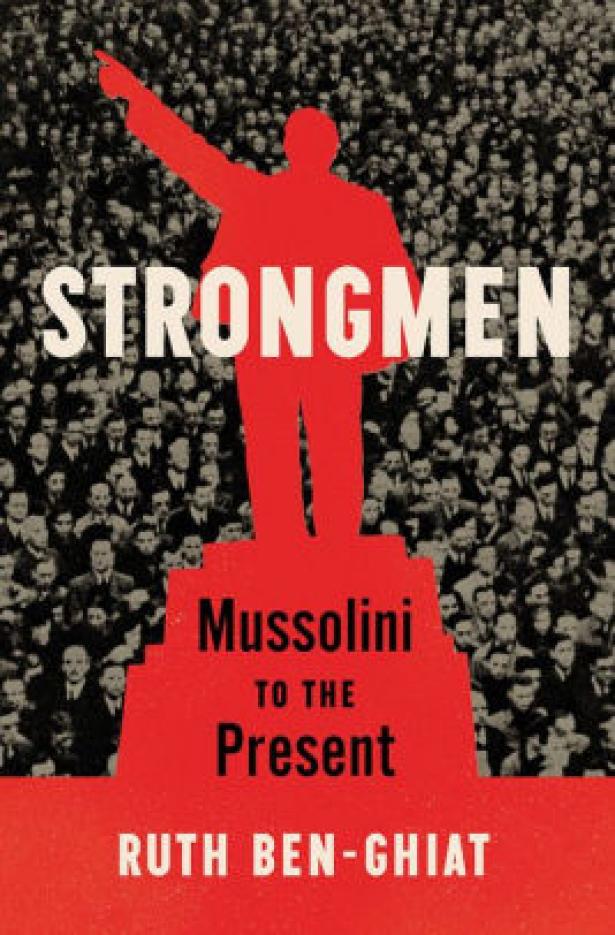Strongmen
Mussolini to the Present
Ruth Ben-Ghiat
W. W. Norton & Company
ISBN: 978-1-324-00154-6
This terrific history of strongmen since Mussolini makes it clear that despite a horrific pandemic and massive economic disruption, ordinary democratic Americans have more to be thankful for this Thanksgiving than ever before.
Comparing the gruesome, granular details of the reigns of Mussolini, Franco, Hitler, Gaddafi, Pinochet, Mobuto, Berlusconi and Erdoğan to the acts and aspirations of Donald Trump, New York University professor Ruth Ben-Ghiat makes a powerful argument that on the scary road to fascism, America just came perilously close to the point of no return.
Almost everything Trump has done has come straight from the authoritarian playbook. Every dictator, for example, has built on the accomplishments of his predecessors.
“Just as Hitler watched Mussolini’s actions carefully,” Ben-Ghiat writes, “so did Gaddafi learn from Lt Col Gamal Abdul Nasser’s 1952 overthrow of the monarchy in Egypt.” Then in the 1980s and 90s, Ronald Reagan and Newt Gingrich served as models for Europeans looking for “a more radical form of conservatism”. Gingrich’s 1994 Contract with America was echoed a year later by the Front National, with its “contract for France with the French”. Berlusconi’s Contract with Italians followed six years later.
In Egypt, Nasser hired “former Nazi propagandists for their expertise in antisemitic messaging”. In Zaire, from 1965, Mobutu Sese Seko’s media handlers reimagined Leni Riefenstahl’s image of Hitler descending from the sky by opening the television news each night with a picture of the dictator’s face, hovering up in the clouds.
The parallels between Trump and his role models are endless. Ben-Ghiat writes of “watching Trump retweet neo-Nazi propaganda, call for the imprisonment [of Hillary Clinton] and lead his followers in loyalty oaths at rallies seemed all too familiar”– and how it filled her “with dread”.
Before the Putin-Trump bromance there was Putin and Berlusconi, grinning at each other from Zavidovo to Sardinia. The way Trump talked about Mexicans was hardly different from Hitler’s words about the Jews or Berlusconi’s about Africans. The Italian media mogul and prime minister was himself just a pale imitation of Mussolini. In the pre-war period, he was responsible for the deaths of 700,000 Libyans, Eritreans, Somalis and Ethiopians.
Every authoritarian regime has seen a crucial alliance between big business and the dictator, from Putin and his oligarchs to Hitler and German industrialists and Trump and the Wall Street elite. The German businessman Ernst von Hanfstaengl, Ben-Ghiat writes, introduced a “cleaned-up Hitler to the moneyed social circles that mattered” – just as Blackstone chief executive Stephen Schwarzman helped legitimize Trump with tens of millions in campaign contributions to him and his Republican allies.
Like all his role models, Ben-Ghiat sees in Trump a “drive to control and exploit everyone and everything for personal gain. The men, women and children he governs have value in his eyes only insofar as they … fight his enemies and adulate him publicly. Propaganda lets him monopolize the nation’s attention, and virility comes into play as he poses as the ideal take-charge man.”
The US has done so much to promote authoritarianism abroad during the last 100 years, it’s actually surprising it took so long before we had to confront it at home.
When Mussolini desperately needed international legitimacy and economic aid in 1926, it was a fascist proselytizer and JP Morgan partner Thomas Lamont who rescued him, brokering a $100m US government loan. Fifty years later, Richard Nixon and Henry Kissinger told CIA director Richard Helms to make Chile’s “economy scream”, so Gen Augusto Pinochet could overthrow the socialist Salvador Allende. Kissinger and William F Buckley became fervent Pinochet apologists, even as thousands were tortured and disappeared.


Spread the word